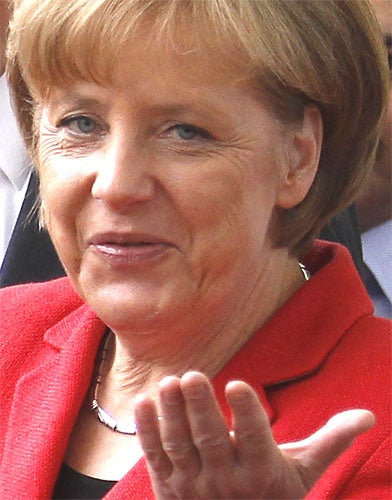Greek instability threatens to topple Merkel's government

Your support helps us to tell the story
From reproductive rights to climate change to Big Tech, The Independent is on the ground when the story is developing. Whether it's investigating the financials of Elon Musk's pro-Trump PAC or producing our latest documentary, 'The A Word', which shines a light on the American women fighting for reproductive rights, we know how important it is to parse out the facts from the messaging.
At such a critical moment in US history, we need reporters on the ground. Your donation allows us to keep sending journalists to speak to both sides of the story.
The Independent is trusted by Americans across the entire political spectrum. And unlike many other quality news outlets, we choose not to lock Americans out of our reporting and analysis with paywalls. We believe quality journalism should be available to everyone, paid for by those who can afford it.
Your support makes all the difference.Growing opposition from the German public to a planned bailout of Greece is jeopardising Angela Merkel's chances in a key state election next week and could ultimately undermine the stability of her coalition government.
The country's most populous state of North Rhine Westphalia goes to the polls on 9 May. At the moment, the conservative Chancellor's Christian Democrats are in government with the liberal Free Democrats in North Rhine Westphalia in a coalition which mirrors Ms Merkel's federal government. But they are facing a stiff challenge from a possible coalition of Social Democrats and Greens.
With less than a fortnight to go before the ballot, opinion polls in the state put the two political groupings either neck and neck or with leads so small as to make any accurate prediction of the outcome impossible.
And it is not just Mrs Merkel's opponents giving her a headache. The Greek bailout has also ignited an untimely political row within the ruling coalition – at both state and national level.
Andreas Pinkwart, North Rhine Westphalia's liberal leader, has been publicly asking why Greece should be offered billions – Germany is expected to stump up an estimated €8.4bn (£7.3bn), by far the largest European Union slice – while Germans are being denied tax cuts.
Guido Westerwelle, her Foreign Minister and the national head of Free Democrats, has insisted that Greece only be given aid if the IMF and the EU deem that its debt poses a direct threat to the euro's existence.
And the Bavarian wing of Ms Merkel's conservatives has demanded that Greece be ejected from the eurozone.
As the countdown to the vote begins, the German leader will be acutely away of North Rhine Westphalia's reputation for making or breaking governments. Her predecessor, Gerhard Schroeder, called an early general election after his ruling Social Democrats were trounced in the state in 2005. Four months later he was ousted by Ms Merkel.
The problem for Ms Merkel is that if she loses on 9 May, her coalition parties will automatically forfeit their majority in Germany's upper house, the Bundesrat. The chances of her government effectively implementing its plans to reform the economy, introduce tax cuts and encourage growth would be seriously undermined as a result.
She would then face the choice of continuing as the head of a lame duck government or calling an early general election.
Until only last week Ms Merkel had assumed that she had bought herself some political breathing space back home after last month's EU summit. She had conveyed the impression that Greece would only be given access to a joint IMF and EU rescue package if Athens introduced a whole series of Draconian belt-tightening measures.
Although Ms Merkel was criticised by some European leaders for being the first German conservative leader to break with her party's consensus of solidarity, at home she was hailed as "Maggie Merkel" for taking an uncharacteristically tough Thatcherite stance and standing up for German interests.
However, the Greek government's weekend demand for urgent help from the International Monetary Fund in the face of plunging investor confidence, has torpedoed Ms Merkel's hopes of being able to put off the problem until 10 May. Yesterday's downgrading of Greece's credit rating to junk status only served to highlight how the Athens crisis is spiralling out of control. Every day the Greek bailout can be delayed might help alleviate the political pressure on Ms Merkel but it risks ramping up the economic pressure.
It is perhaps a risk the German leader considers worth taking, especially given an opinion poll released yesterday by the Ifratest Dimap group showed that at least two thirds of Germans were opposed to the bailout.
Germany's mass circulation Bild newspaper claimed that a poll of its readers showed that at least 80 per cent rejected the idea.
Join our commenting forum
Join thought-provoking conversations, follow other Independent readers and see their replies
Comments